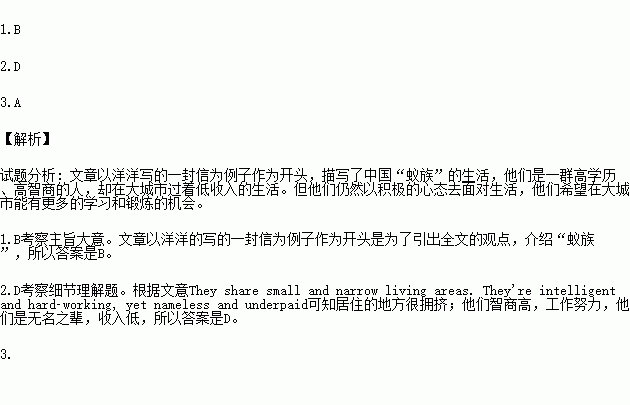题目内容
Several hundred strangers received “love letters” from a young man on the street. The letter was written and given out by Yang Yang,a student majoring in human resources at Chongqing University of Science and Technology, who hoped to show his disappointment with job hunting.
Yang's story has caught media attention perhaps because it is similar to those of millions of recent graduates seeking jobs and struggling for survival in the country's wealthiest cities. They have diplomas, rather than professional skills, and come to big cities in hopes of better lives, only to find low-paying jobs and poor living conditions.
They are China's “ant tribe (蚁族)”,a term coined by sociologist Lian Si from Peking University in his 2009 book, Ant Tribe.“They're so similar to ants. They share small and narrow living areas. They're intelligent and hard?working, yet nameless and underpaid.”The term also speaks to their helplessness in a world governed by the law of the jungle-only the strongest survive.
A survey in Lian's another book published this year, Ant Tribe Ⅱ, found nearly 30 percent of “ants” are graduates of famous universities-almost three times last year's percentage. Most had degrees in popular majors. In addition, 7.2 percent of “ants” have at least a master's degree compared to 1.6 percent in 2009.
An “ant's” average monthly salary is 1,904 yuan, with about 64 percent of them earning less than 2,000 yuan a month.
Another survey in the 2010 Annual Report on the Development of Chinese Talent found more than 1 million “ants” live in big cities.
“Most ants are from rural families or small towns, and their experiences in universities didn't arm them well enough to fight with competitors in big cities' employment markets.”Professor Zhang Ming at Renmin University of China said.
The “ant tribe's” embarrassing living situations have become a serious social problem, and the government should develop smaller cities to attract more graduates from big cities, Zhang believed.
However, “ants” expect more study and training opportunities in big cities, which keeps them positive despite their situations.
1.Yang's story is introduced in order to ________.
A.analyze graduates' difficulties in finding jobs
B.lead to the topic of the article-“ant tribe”
C.tell readers a story about those big cities
D.show a clever way of dealing with pressure
2.“Ant tribe” members are similar to ants in the following aspects EXCEPT that ________.
A.they live in narrow and small places in groups
B.they work hard but earn little for survival
C.they are in a world judged by the jungle law
D.they are pleased with being nameless and underpaid
3.By writing this article, the author mainly intends to show________.
A.despite better education,“ants” are still struggling
B.despite difficulties,“ants” have a promising future
C.better education, better job opportunities
D.Ant Tribe is a good book to help understand today's China
 小学课时特训系列答案
小学课时特训系列答案
